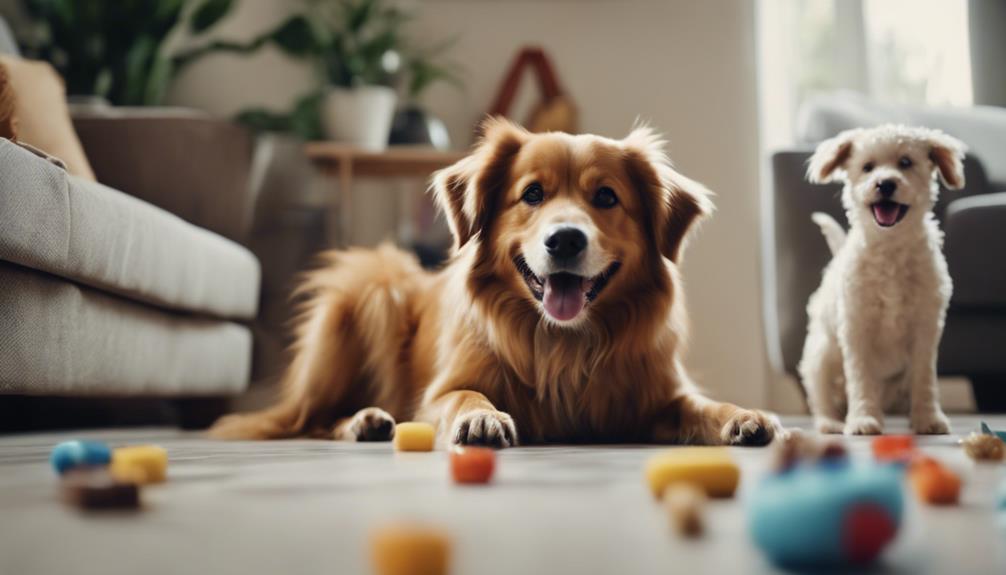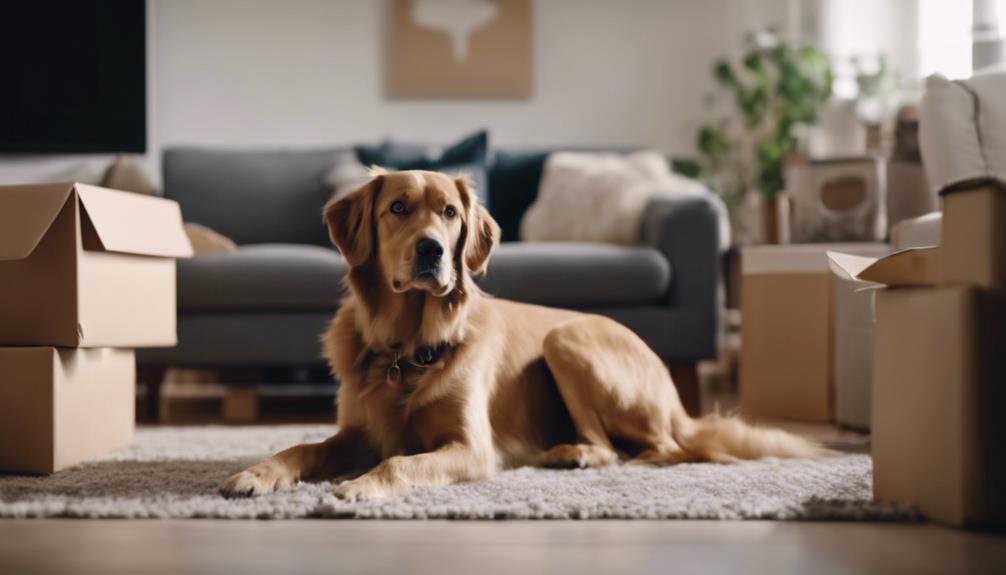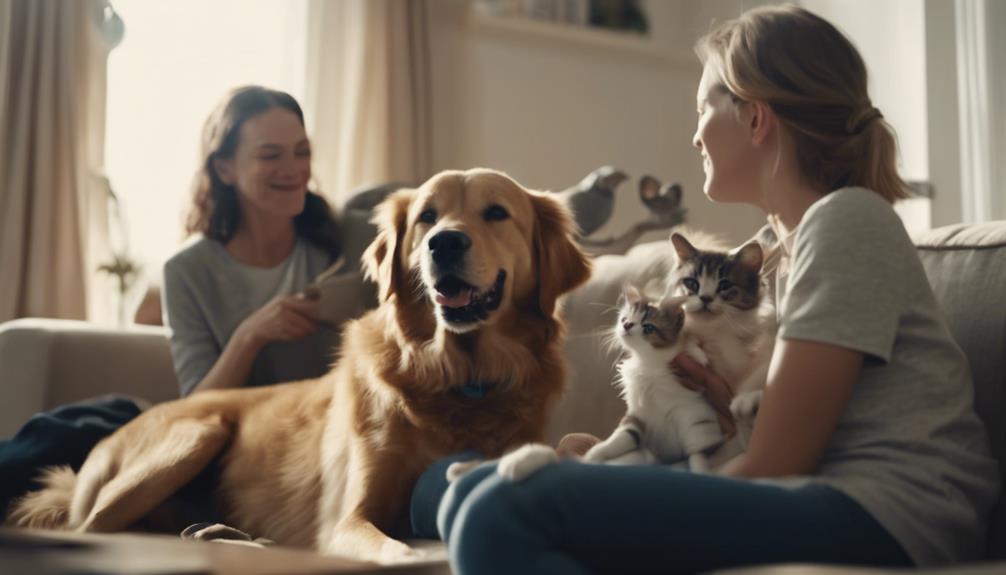
Embarking on the journey of adopting an adult dog comes with a set of responsibilities and considerations that necessitate thoughtful planning. From understanding the intricacies of different breeds to navigating the adoption process and associated costs, there are numerous facets to ponder.
This guide aims to equip prospective pet parents with the essential knowledge and insights required to make informed decisions and ensure a successful transition for both the adopter and the adopted canine companion. By delving into the nuances of pre-adoption preparations and post-adoption care, individuals can lay a solid foundation for a fulfilling relationship with their new four-legged family member.
Key Takeaways
- Consider lifestyle and needs when choosing a dog breed
- Understand adoption costs and benefits of adult dogs
- Prepare for the responsibilities and expenses of dog ownership
- Provide a loving and structured environment for your new dog’s adjustment
Choosing the Right Dog Breed
To ensure a harmonious match between you and your future canine companion, it is crucial to carefully select a dog breed that suits your lifestyle and preferences. Researching different breeds and understanding their characteristics is essential. Consider factors such as exercise needs, grooming requirements, and socialization tendencies when choosing a breed.
Think about the size, energy level, and temperament that would best fit your living situation. Consulting with shelter staff can provide valuable insights into the unique needs and activity levels of dogs available for adoption.
Adoption Process and Costs
When exploring the adoption process for an adult dog, understanding the associated costs and procedures is essential for prospective pet owners.
Inquire about matching programs offered by shelters to find a dog that suits your lifestyle. Adoption fees typically range from $50 to $500, depending on the shelter and location. Additional costs may include vaccinations, spaying/neutering, and microchipping, but these are often included in the adoption fees for shelter dogs.
It’s important to consider the overall expenses beyond just the initial adoption fee, such as food, grooming, and veterinary care. By being aware of these costs upfront, you can make an informed decision and provide the necessary care for your new furry companion.
Benefits of Adopting an Adult Dog

Adopting an adult dog presents numerous advantages, including their trained behavior and fully developed personalities. When considering bringing an adult dog into your home, you can benefit from:
- Already Trained: Adult dogs are often already housebroken and have basic training, saving you time and effort.
- Established Personality: Their temperament and behavior traits are well-established, making it easier to understand their needs and compatibility with your lifestyle.
- Lower Maintenance: Adult dogs may require less supervision and attention compared to puppies, fitting well into busy schedules.
- Quick Bonding: Older dogs are known to form strong bonds quickly, providing companionship and loyalty from the start.
Adopting an adult dog not only enriches your life but also gives a deserving dog a second chance at a loving home.
Pre-Adoption Considerations
Prior to bringing a new dog into your home, it is essential to carefully assess your lifestyle, living environment, and current pet situation. Consider factors such as the time you can dedicate to a dog, the space available for exercise and play, and the compatibility with any existing pets. Research breeds that match your energy level and living arrangements to ensure a good fit.
Prepare for the financial responsibilities associated with pet ownership, including food, veterinary care, grooming, and potential emergencies. Understand the commitment required for training, exercise, and socialization. Additionally, inquire about the history, temperament, and any special needs of the dog you are considering to ensure a successful adoption and integration into your family.
Transitioning to a New Home

Upon bringing your new adult dog home, it is crucial to facilitate a smooth transition by allowing them the necessary time to acclimate to their unfamiliar surroundings. Here are some key steps to help your new furry friend adjust:
- Designate a Safe Space: Create a quiet, comfortable area where your dog can retreat to feel secure.
- Slowly Introduce the Home: Gradually introduce different areas of your home to prevent overwhelming your dog.
- Establish a Routine: Set a consistent schedule for feeding, exercise, and bathroom breaks to provide structure.
- Show Affection and Patience: Offer reassurance, love, and patience to help build trust and a strong bond with your new companion.
Establishing Care and Routine
When welcoming an adult dog into your home, it is essential to establish a consistent care routine from the outset. This routine should include regular feeding times, daily exercise, grooming sessions, and training activities.
Providing a stable and predictable environment will help your new dog feel secure and adjust more easily to their new surroundings. Make sure to set up a comfortable sleeping area, designate feeding spots, and establish a potty routine to prevent accidents.
Additionally, scheduling regular vet check-ups, maintaining vaccinations, and ensuring proper hygiene are crucial aspects of caring for your adult dog. By setting up a structured routine early on, you can create a strong foundation for a happy and healthy life together.
Introducing to Family and Pets

How can you ensure a smooth introduction between your new adult dog and existing family members and pets?
Introducing your new furry family member to your current pets and loved ones can be a delicate process. To help facilitate a harmonious integration, consider the following steps:
- Slow and Supervised Encounters: Allow gradual introductions in a controlled environment to prevent overwhelming interactions.
- Positive Reinforcement: Reward good behavior and interactions between pets to create positive associations.
- Respect Personal Space: Ensure all animals have their own safe spaces and retreats to feel secure.
- Professional Guidance: Seek advice from a professional trainer or behaviorist for expert assistance in managing introductions.
Monitoring Health and Behavior
To ensure the well-being of your newly adopted adult dog, diligent monitoring of their health and behavior is essential. Keep a close eye on any changes in appetite, water intake, bathroom habits, energy levels, and overall demeanor.
Regular veterinary check-ups are crucial to catch any potential health issues early on. Look out for signs of distress, discomfort, or unusual behavior that may indicate underlying problems. Establish a baseline of your dog’s normal behavior to easily identify any deviations.
Maintain a consistent routine for feeding, exercise, and grooming to promote good health. By staying observant and proactive, you can provide the best care for your adult dog and address any concerns promptly.
Can the same daily schedule for a puppy be applied to an adult dog when adopting?
When adopting an adult dog, it’s important to create a new daily puppy schedule to ensure their happiness and comfort. While some elements of the schedule may be similar, adult dogs often have different needs and energy levels compared to puppies. It’s important to tailor the schedule to the individual dog.
Conclusion
In conclusion, adopting an adult dog requires careful consideration of breed characteristics, adoption process, costs, and post-adoption care. By understanding the benefits of welcoming an adult canine companion into your home and being prepared for the transition, new pet parents can provide a loving and nurturing environment for their furry friend.
Responsible pet ownership involves establishing a routine, monitoring health and behavior, and ensuring a harmonious relationship with the adopted adult dog.




